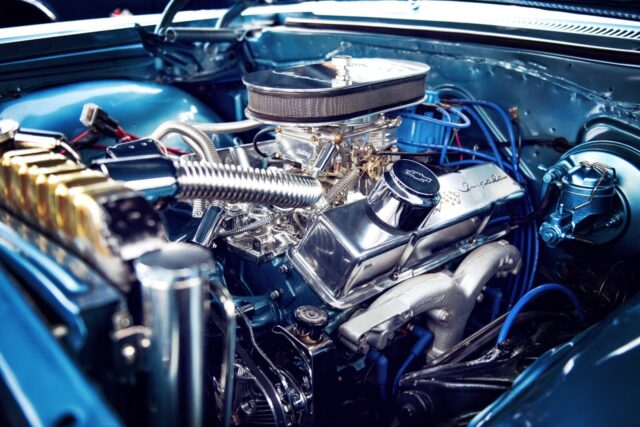
Do remember the last time when your eyes went across your car’s engine temperature gauge in the instrument cluster? How often do you pay attention to the engine temperature gauge? Perhaps, the engine temperature gauge is the most ignored and taken-for-granted gauge of all the gauges that are there on the instrument panel.
However, that’s perhaps the most critical indicator of them all, and thanks to the advanced and super-reliable engines that cars these days employ, you do not have to look at it and care about it all that much.
So, the engine temperature gauge, as the name suggests, reads out the engine temperature for you. Now, the temperature of the engine is an extremely critical aspect for the functioning and life of your engine. A super cold engine would never start in the first place and that’s something we’ve commonly noticed during winter. On the other hand, overheating can prove to be detrimental to the engine and render it useless.
So that might make you wonder what’s the normal temperature for an engine to work at? How hot does a car engine get? Why does it even have to get hot? And what could I possibly do to prevent my engine from functioning at high temperature? At CarIndigo they have compiled this article to answer these questions that you may have.
Why does the car engine get hot?
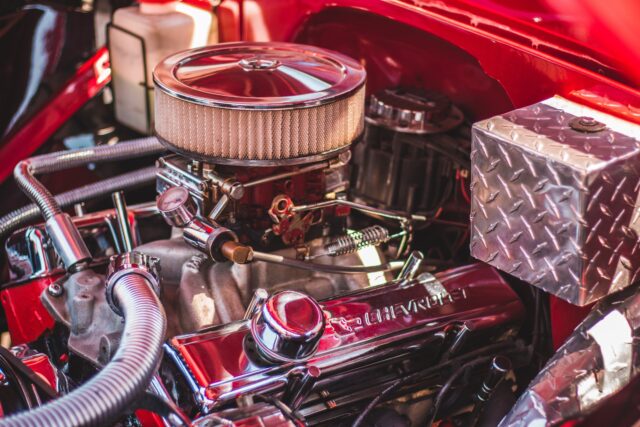
Before we answer that, let’s give you a dose of science. The engine of a car is a thermodynamic system and is governed by the second law of thermodynamics. The second law states that whenever energy is transferred or transformed from one form to another, some part of it is lost and wasted. In an engine of a car, the chemical energy of the fuel is transformed into mechanical energy, however, it is impossible to convert 100% of the chemical energy to work.
A major part of the energy generated by the combustion of fuel is lost in the form of heat and it is basically useless for the thermodynamic system, which in this case, is your car’s engine. This wasteful heat is the reason why car engines get hot, as simple as that.
So, how hot does the average car engine get?
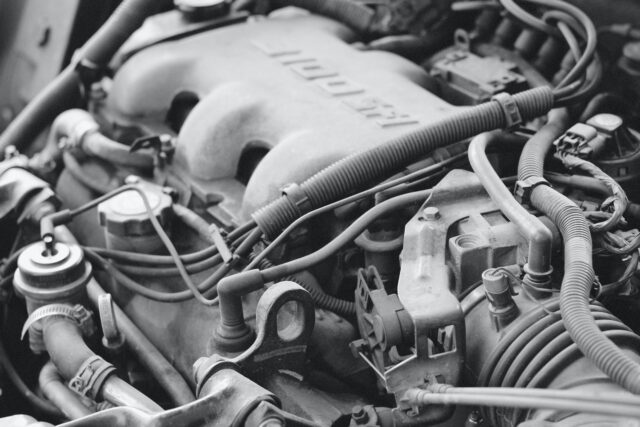
Well, the temperatures the bread and butter car engines hit at average working conditions range around 195-250 degrees Fahrenheit. And that’s the ideal temperature the average car’s engine should be working at to deliver ideal performance.
Some high-performance race cars are designed to work at higher temperatures. The temperatures of these engines can go anywhere from 300 to 400 degrees Fahrenheit. That’s typically the case with track cars but street-legal cars still operate at lower temperatures.
Now, there are hardly any cars that display the exact temperature and generally, it’s a gauge or a needle that ranges from cold to hot. If you’ve ever properly observed the gauge, you’d noticed that the needle hardly ever crosses the mid-point on the gauge and that’s generally where the needle points in most cars under normal working conditions. So, when the needle starts closing towards the ‘H’ mark on the gauge, you should understand that something’s not correct.
And this might bring you to yet another question. What could lead to engine overheating? Well, we have the answer.
Different from cars, truck engines typically operate within a temperature range of 180 to 210 degrees Fahrenheit (82 to 99 degrees Celsius) under normal operating conditions. This temperature has to be frequently checked in order to avoid any type of truck accident.
Causes of engine overheating
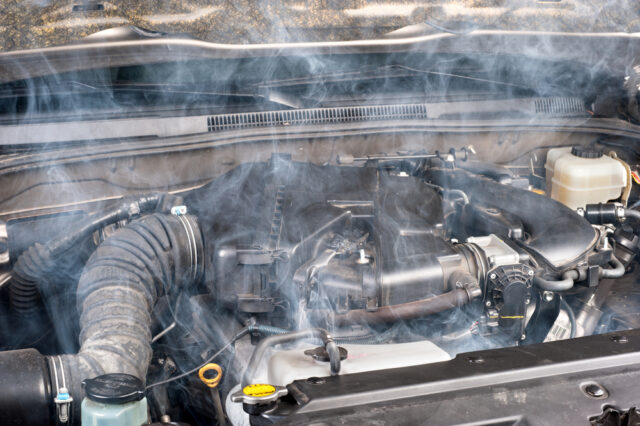
Well, engine overheating is commonly seen when you drive the car for a long time, non-stop, maybe on a super hot day. That’s the most common scenario where drivers have noticed their engines reaching abnormally high temperatures.
Towing or carrying loads heavier than the vehicle’s rated capacity. Many of us tend to ignore the rated capacities of our trucks and SUVs and go on loading stuff in. However, we do not realize that doing so just over-burdens the engine which further leads to overheating.
Running the air-conditioning on full blast for a long time could be yet another factor responsible for overheating the engine. The compressor of the AC draws power from the engine and loads the engine. Running the AC on full power for long hours can just cause the engine to overheat.
If you’re doing none of the things stated above, then the most obvious reason for engine overheating is low coolant levels. If you haven’t checked and refilled the engine coolant, then the insufficient amount of coolant may cause the engine to overheat.
A malfunctioning engine cooling fan also fails to regulate the engine’s temperature and can cause the needle on the gauge to rise. A malfunctioning water pump or a slipping drive belt can also lead to overheating.
While some high-performance race cars are engineered to function optimally at elevated temperatures, ranging between 300 to 400 degrees Fahrenheit, a similar principle applies to certain motorcycles designed for speed. However, it’s important to note that this heat level is more common in track cars, whereas street-legal cars tend to operate at lower temperatures, similar to their motorcycle counterparts
How to prevent overheating? What to do if the engine overheats?
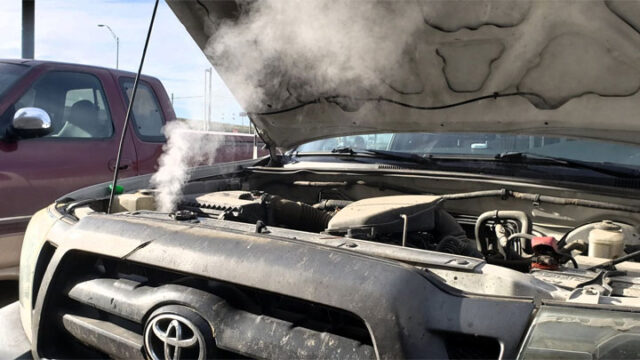
Well, if you see the needle rising and closing up to the ‘H’ mark, turn the AC off. If that doesn’t work, stop the vehicle under a safe spot, preferably under a shade away from sunlight. Pop up the hood and let some cool air flow in and turn the heater on.
If that doesn’t help either, it’s definitely an issue with the radiator. Check the coolant levels and check for any leaks around. If you find that the coolant levels are low or if there’s a leak, drive the vehicle with the AC turned off to the nearest mechanic and get it fixed. Better off, have the vehicle towed and refrain from turning the engine on.
Moreover, the radiator’s fins sometimes get clogged due to some debris from the road flying in and may hamper the cooling process. So check and try cleaning the radiator fins and that could just simply solve the problem.
If you’ve been parking the car for a long time under the direct sun that perhaps could also cause the engine to heat. So avoid parking under direct sun. Park it in a proper shade and that could just prevent overheating.
Long story short…
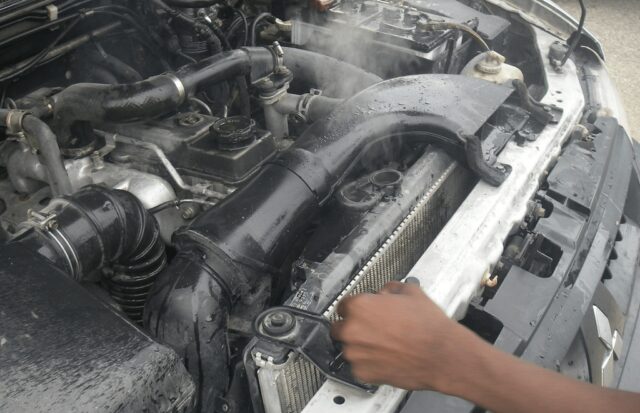
There can be many factors that could lead to rising engine temperature but the remedy to solve this can be as simple as popping the hood and letting the cold air in. So, there’s nothing to worry about if your temperature gauge points higher than normal if you’re driving on a hot day, with A/C on full blast and with many passengers and luggage in.
Furthermore, modern cars come with a lot of sensors and safety systems and in case if the temperature of the engine shoots a bit too high, the car cuts the engine off on its own, preventing it from any further damage. Typically, if the engine temperature rises above 400 degrees Fahrenheit, the engine turns off on its own to prevent damage in many modern cars.
However, the check engine warning will turn on in older cars if the engine temperatures shoot up really high. All-in-all, engine overheating can be avoided if you drive the car well, take good care of it, maintain the fluid levels and don’t abuse and load the engine.









